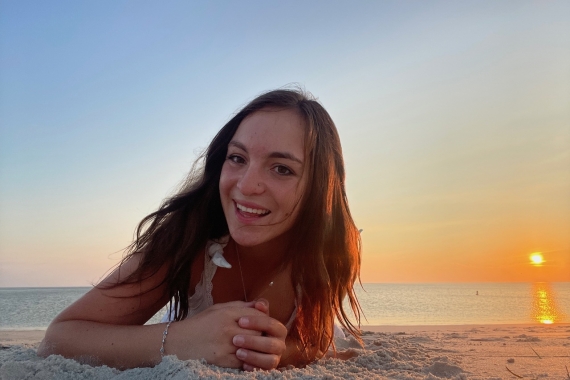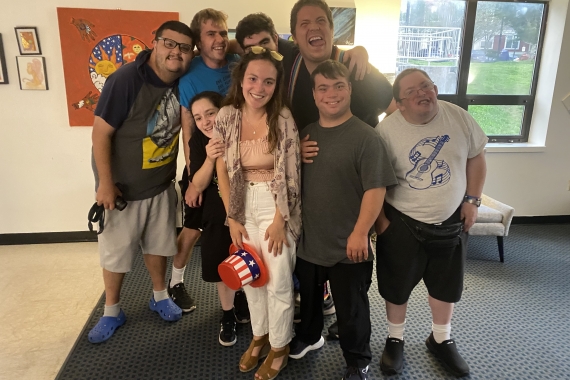The ESC can complement any single concentration. Students pursuing the ESC conduct intensive interdisciplinary inquiry into their defined public, civic, and/or social justice issue (e.g., criminal justice reform, educational equity, environmental justice), coupled with direct engagement with communities, organizations, and practitioners outside of the academy. Each student will take a required foundational seminar and propose a set of three experiences—a three-course interdisciplinary elective sequence, a community-based practicum, and a capstone—related to the issue they define as their focus.
The following provides an overview of each of the ESC’s four requirements.
-
Foundational Seminar (1 credit): SOC 0310: Theory and Practice of Engaged Scholarship (One section of SOC 0310 is currently offered each Fall and Spring semester, typically on Wednesdays between 3:00-5:30 p.m.)
-
Interdisciplinary Electives (3 credits):
-
One Community-Based Learning and Research (CBLR) Course that relates to the student’s stated public, civic, and/or social justice issue.
-
One Issue Area Course that addresses the student’s stated public, civic, and/or social justice issue.
-
One Critical Perspectives Course that relates to the student’s stated public, civic, and/or social justice issue and examines the broader ethical, political, and social context of that issue area. Students are strongly encouraged to consider Race, Power, and Privilege-designated courses or other courses that address issues of structural inequality, the root causes of social problems, and the production of knowledge and difference in the context of discourses on race, power, and privilege.
-
Sample courses and student pathways through the ESC can be found in the ESC Student Handbook. However, these sample courses and pathways are not comprehensive. When declaring the ESC in ASK, students may propose other courses as electives (e.g., a course that is engaged but does not carry the CBLR designation or an independent study course that meets the criteria for any elective category). Students are encouraged to email or meet with Swearer Center staff to discuss their ESC Program Plan, including any proposed course substitutions or transfer credits from a course at another institution.
There are no defined expectations around grading options and the ESC. Students may elect their ESC courses to be graded on a basis of either A,B,C/No Credit or Satisfactory/No Credit.
-
Practicum (0-1 credits): The ESC practicum is a significant practice-based experience (e.g., internship, fellowship, volunteer role, etc.) with a community organization or project, during which students also complete a series of reflective assignments. In most cases, the practicum will be completed as a non-credit-bearing experience. However, it may be fulfilled through a credit-bearing course, such as the Brown in Washington, D.C. Practicum course. A list of past Engaged Scholars' practicums can be found here. (A Brown University log-in is required.)
-
Capstone (0-1 credits): The ESC capstone will provide students with a culminating learning experience through which they reflect back on their certificate work and demonstrate achievement and competency with respect to key learning outcomes articulated in their ESC declaration. ESC students will have two options for fulfilling the capstone requirement:
-
Credit-Bearing Option (Engaged Research): Students who elect this option will pursue an engaged course involving research or other project-based work with a community partner organization. Students may select an upper-level course—including potentially a concentration capstone/honors thesis course—or propose an independent study (Departmental Independent Study Projects or Group Independent Study Projects) aligned with their research interests and, with the agreement of the instructor, pursue a project with a collaborating non-academic partner.
-
Non-Credit-Bearing Option (ePortfolio/Reflection Essay): Students who elect this option will create an electronic portfolio (ePortfolio) of representative ESC work. The ePortfolio will consist of papers, projects, and/or other artifacts developed in courses and the ESC practicum. It will be accompanied by a reflective essay that responds to a series of prompts about the student’s community-engaged learning experiences.
-
A list of past Engaged Scholars' capstones can be found here. (A Brown University log-in is required.)
The ESC will require four to five courses, depending primarily on whether a student elects a credit- or non-credit-bearing capstone.
The College Curriculum Council has provided an overview of undergraduate certificates at Brown, as well as detailed guidelines for students who wish to pursue a certificate, including the ESC. Students may formally declare their intention to pursue the ESC if they meet the following criteria:
-
have an approved concentration on file in ASK;
-
have completed or are currently enrolled in at least two courses that will meet requirements for the ESC. In most cases, one of these courses will be the required ESC foundational seminar, SOC 0310: Theory and Practice of Engaged Scholarship, which ideally will be taken during a student’s third, fourth, or fifth semester at Brown, although it is open to students at every semester level;
-
have included a written statement in ASK discussing their rationale for pursuing the ESC and the relationship between it and their declared concentration;
-
are enrolled in at least their fifth or sixth semester,* and it is no later than the last day of classes in their antepenultimate (typically the sixth) semester. (See Brown’s Academic Calendar for more details.)**;
-
are not pursuing another certificate at Brown;
-
are pursuing only one concentration at Brown; and
-
have no more than one course in their ESC Program Plan that overlaps with their declared concentration. When feasible, students are encouraged to have the credit-bearing capstone option be that course.***
*Students do not advance to being a fifth or sixth semester student until the beginning of each full-time term (with four semester enrollment units) in question. For example, a full-time student that is in their fourth semester during any given spring semester will not advance to being a fifth semester student until the beginning of the following fall semester. Therefore, most students will not be able to declare the ESC until the start of their fifth semester during any given fall semester.
**Students pursuing a 5th-year combined degree at Brown (e.g., Brown | RISD Dual Degree Program) may petition the Committee on Academic Standing (CAS) in ASK for the option to pursue the ESC, and must do so no earlier than their sixth semester and no later than the last day of classes in the antepenultimate (typically the eighth) semester. Please email [email protected] with any questions.
***Sociology concentrators can count the ESC foundational seminar, SOC 0310: Theory and Practice of Engaged Scholarship, or SOC 1950: Senior Seminar as the one course that overlaps with their concentration.
Students who are not eligible to declare the ESC may still enroll in the foundational seminar (SOC 0310: Theory and Practice of Engaged Scholarship) and/or meet with Swearer Center staff, including the Swearer Center Peer Advisors, to discuss their interests and other opportunities for pursuing engaged scholarship at Brown. Please email [email protected] with any questions.
Check back soon for upcoming events.
With any questions about the ESC, please contact [email protected].
Students also can schedule an office hours appointment here.


